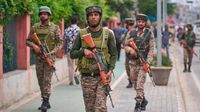A Dangerous Stand-Off Between India And Pakistan
As tensions escalate following a deadly terrorist attack in Pahalgam, significant geopolitical developments unfold between India and Pakistan.
On April 22, 2025, five to six terrorists opened fire on a group of tourists in Baisaran meadow, located approximately five kilometers from Pahalgam, Kashmir. This incident resulted in the tragic loss of 26 lives, marking one of the deadliest civilian attacks in the region in recent years. The attack was claimed by The Resistance Force (TRF), an affiliate of the notorious Pakistani terrorist group Lashkar-e-Taiba.
In the wake of this violence, India has witnessed a surge in nationalistic sentiments. Union Home Minister Amit Shah vowed revenge against the perpetrators, asserting that "terrorism will be eradicated from every inch of the land in Jammu and Kashmir." He emphasized the government's resolve under Prime Minister Narendra Modi to combat terrorism decisively.
As the situation unfolds, Pakistan has responded by banning Indian songs from FM radio stations, a move that has been hailed as a "patriotic gesture" by the Pakistan Broadcasters Association. This ban came shortly after India restricted Pakistani artists and content on its platforms, escalating the cultural and political rift between the two nations.
Amidst these tensions, Maulana Shahabuddin Razvi Bareilvi, the national president of the All India Muslim Jamaat, appealed to Indian Muslims to hold special prayers for national unity following the attack. He urged imams to organize a special dua after Friday prayers, emphasizing the importance of solidarity in the face of adversity.
International reactions have also emerged, with US Secretary of Defense Pete Hegseth expressing condolences to Indian Defence Minister Rajnath Singh. Hegseth reiterated the US government's full support for India in its ongoing fight against terrorism, highlighting the global concern surrounding such acts of violence.
On the ground, the National Investigation Agency (NIA) has intensified its investigation into the Pahalgam attack. NIA Director General Sadanand Vasant Date visited the attack site on May 1, conducting an on-ground assessment. Reports indicate that nearly 100 individuals have been questioned, with 15 under close scrutiny as the agency seeks to uncover the attackers' identities.
Despite ongoing operations, the attackers remain untraced ten days after the incident. Security forces are challenged by the dense forests of Anantnag district, which provide natural cover for the terrorists. Intelligence sources suggest that the attackers, likely trained in Pakistan, are well-prepared and equipped to evade capture.
In response to the heightened security concerns, Pakistan has announced the closure of specific portions of Karachi and Lahore airspace for four hours daily throughout May. This move reflects Islamabad's apprehension regarding potential retaliatory actions from India.
Additionally, the Pakistan Air Force has been conducting military exercises, including Fiza-e-Badr and Zarb-e-Haidari, involving major fighter aircraft fleets. These drills, which began on April 29, are seen as a show of strength amid the escalating tensions.
Back in India, a Bengaluru resident has filed a plea in the Supreme Court, claiming he and his family were wrongfully detained and ordered to leave the country. This case has drawn attention to the complexities surrounding citizenship and deportation in the wake of the ongoing conflict.
Moreover, discussions are underway regarding the potential banning of Pakistani ships from Indian ports, further tightening the economic and diplomatic noose around Islamabad. An official announcement regarding this ban is expected soon.
As tensions simmer, demonstrations have erupted in various locations. Members of the Indian community in the UK gathered to show solidarity with India, countering a protest organized by pro-Khalistani and Pakistani demonstrators outside the Indian High Commission in London. The Indian-origin demonstrators raised slogans condemning terrorism and expressing their support for their homeland.
In Indore, police have registered a case against unidentified individuals for allegedly raising "Pakistan Zindabad" slogans during a protest against the Pahalgam attack. The authenticity of the video evidence is under investigation, reflecting the charged atmosphere in the region.
The Supreme Court of India recently refused to hear a petition seeking a probe into the Pahalgam terror attack, with the court emphasizing the need to avoid demoralizing the forces engaged in counter-terrorism efforts.
As the situation develops, the Indian Navy is ramping up its presence in the Arabian Sea, conducting exercises and maintaining a vigilant stance against any unusual activities. This military readiness underscores India's commitment to national security in the face of ongoing threats.
The Pahalgam attack has not only triggered a wave of nationalistic fervor but has also reignited discussions about the broader implications of terrorism in the region. With both countries on high alert and military preparations underway, the potential for further escalation looms large.
As India grapples with the aftermath of the Pahalgam tragedy, the call for unity and resilience resonates across the nation. The coming weeks will be crucial in determining the trajectory of India-Pakistan relations and the ongoing fight against terrorism in the region.




